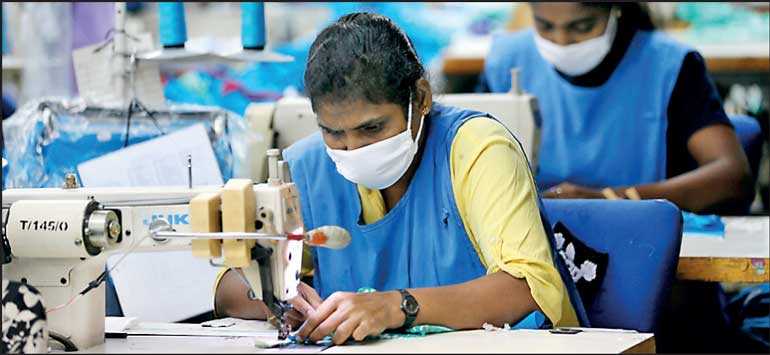Friday Feb 27, 2026
Friday Feb 27, 2026
Wednesday, 25 November 2020 00:00 - - {{hitsCtrl.values.hits}}

By Charumini de Silva
The Joint Apparel Association Forum (JAAF) yesterday expressed confidence in revival of the country’s biggest export sector next year onwards aided by policy direction and support outlined in the Budget 2021 as well as recovery in key markets post-COVID-19.
“We made submissions to the Government and most of our proposals have been incorporated in the Budget 2021. We are pleased to see such policy direction at this critical time for the export oriented industries,” JAAF Secretary General Tuli Cooray told the Daily FT.
Although the industry took a harsh blow from COVID-19 which wiped out close to $ 1 billion in turnover, Cooray said resilience has always been the cornerstone for the apparel industry.
“History has amply proved that Sri Lanka is a resilient nation and the apparel industry remains to be a major contributor. At the moment we are not thinking of revisiting our targets, but we all know that it has been a very challenging year for the entire world. In that context, we will probably see a decline in our total exports by 25% to 30% this year just over $ 4 billion. But it is with great confidence I say the apparel sector will come out of this crisis stronger than before,” he said.
Sri Lanka last year earned $ 5.3 billion from apparel exports, an increase of 5.1% from 2018. Prior to the COVID-19 pandemic the industry originally expected a 6% increase in exports for 2020.
Export earnings from apparel and textiles in October declined by 18.93 % to $ 356.52 million and by 21% to $ 3.6 billion in the first 10 months of 2020 from a year earlier. Despite the decline in the sector, earnings from exports of other textiles increased by 43.92% in October 2020 in comparison to October 2019.
Earnings from export of Personal Protective Equipment (PPE) related products increased by 46 % to $ 731.63 million in January to October. The strong performance was mainly due to the increased exports of other made-up articles (HS 630790) and articles of apparel and clothing accessories of plastics (HS 392620).
Cooray said it was very challenging as the industry markets remain closed, with the world still continuing to battle the impact of the virus. “Many countries such as India, China, Russia and the US are having very protective policies and not open for trade,” he added.
Noting that the apparel industry is continuously looking for access to new markets, he highlighted that they were exploring opportunities to open up trade dialogue with all existing and emerging markets. “The UK, Japan and the US are currently reviewing unilateral trade agreements and we are open to explore such opportunities given the current circumstances,” he said.
Boost for fabric manufacturing
Cooray also commended the timely move to establish fabric processing park in Eravur, noting that it is a reflection of the Government’s confidence in the apparel industry.
The 2021 Budget announced tax concessions up to a maximum of 10 years under the Strategic Development Law for over $ 10 million investment in setting up fabric plants.
“We stand firm even in the current climate that it is our intention to continue to be a strong player in the global apparel sourcing world. The establishment of the Eravur Fabric Processing Park will help reduce the imports of fabric as apparel manufacturers would be able to replace a part of their imported fabrics with fabric sourced locally,” he said.
According to him, there are currently seven textile mills manufacturing fabric for the export-oriented sector and these mills are capable of producing the finest quality of fabrics where the daily output is around 175 MT.
This is a vital component in the building the industry value addition to over 52% even after accounting for the yarn imports of the local mills. Sales from these seven fabric mills to the BOI registered apparel exporting companies amounted $ 499 million last year. In 2019, Sri Lanka imported 255,437 MT of fabric both for the export-oriented apparel manufacturers and for consumption in the local market. The import bill for this fabric came to $ 2.2 billion.
Worker safety
With regards to work at apparel factories, he said operations continue with strict health guidelines as the industry remains a critical contributor to the sustainability of the economy. “We are a part of the society.
“Our workers’ health and safety is our prime focus, as all our businesses rely on them. Despite the heavy losses the industry incurred due to COVID-19, we have not neglected the welfare and job security of our workforce. We now incur an additional heavy cost for the regular PCR tests, lodging facilities, transport because their lives matter. Apparel industry largest overall employer,” he said.
Entirely privately owned and operated, the apparel industry have successfully utilised the opportunities in the international market to evolve beyond traditional exports and tailoring designs to provide sophisticated and creative solutions through fashion BPO services, research, development and innovation centres. Around 300 garment factories employ 990,000 and over one million people are indirectly dependent or employed.